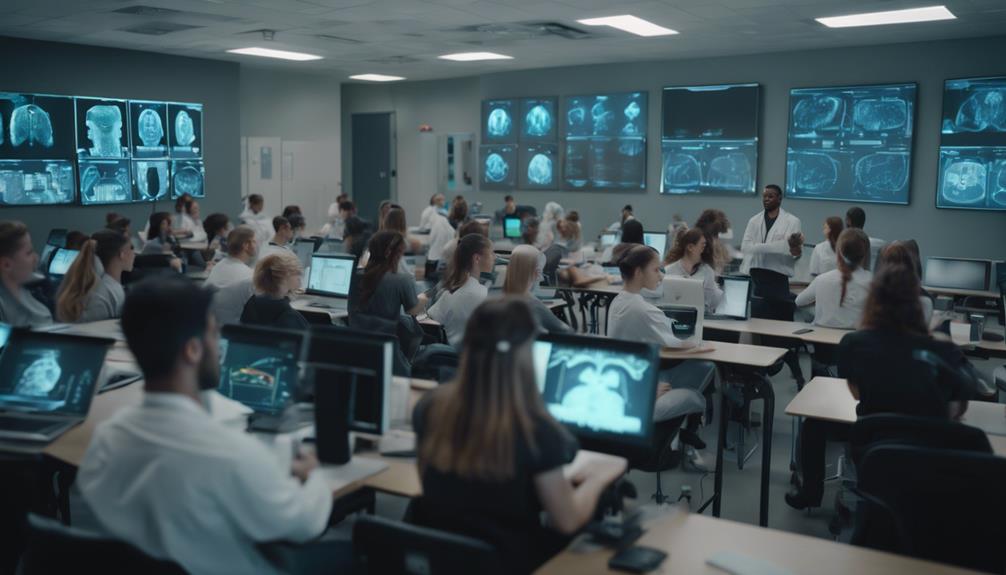Healthcare AI jobs offer you the opportunity to innovate and revolutionize patient care. Positions like Healthcare AI Engineers and Clinical AI Application Specialists focus on integrating cutting-edge technology into healthcare systems. Strong programming skills in languages like Python and SQL are crucial, along with a solid grasp of data analysis. Continuing education and advanced learning will help you stay competitive in this rapidly growing field. With hospitals producing vast amounts of data daily, your expertise could lead to advancements in diagnostics and patient outcomes. Discover the exciting opportunities available in this dynamic sector, where your skills can truly make a difference.
Types of AI Jobs

When you explore the types of AI jobs in healthcare, you'll find a variety of roles tailored to different skills and interests.
From Healthcare AI Engineers who design innovative solutions to Clinical AI Application Specialists who apply these technologies in real-world settings, the options are diverse.
Leadership positions and roles focused on ethics and compliance are also emerging, reflecting the complex landscape of AI integration in healthcare.
Healthcare AI Engineering Positions
Healthcare AI engineering positions encompass a variety of roles that combine technical expertise with an understanding of the unique challenges in the healthcare sector. As a Healthcare AI Engineer, you'll need strong programming skills and knowledge of healthcare data standards to develop and implement AI solutions. If you lean towards natural language processing, a Healthcare AI Prompt Engineer role might suit you, where expertise in healthcare terminology is vital.
With hospitals generating an astonishing 137 terabytes of data daily, the demand for professionals who can analyze and leverage this data effectively is skyrocketing. Key skills for success in healthcare AI include proficiency in programming languages like Python and R, a solid grasp of machine learning algorithms, and the ability to communicate complex concepts to non-technical stakeholders.
New job categories are emerging, such as Medical Data Scientist and Health Data Analyst, indicating significant growth in the healthcare AI job market. Staying current through continuous education and specialized certifications is essential, as this field is rapidly advancing.
Embrace the opportunity to innovate and make a meaningful impact in healthcare through these engineering positions.
Clinical AI Application Specialists
Clinical AI Application Specialists are fundamental for seamlessly integrating AI technologies into healthcare settings, ensuring they enhance patient care and operational efficiency. You'll find that these specialists play a significant role in aligning AI in healthcare with clinical workflows, applying machine learning and data analytics to improve outcomes.
As the demand for AI tools grows, particularly for diagnostics and patient engagement, job growth in this field is projected to soar. To succeed, you'll need a strong skill set that includes proficiency in programming languages like Python, familiarity with data visualization tools, and a solid grasp of healthcare regulations and ethical considerations.
Organizations are increasingly seeking Clinical AI Application Specialists to navigate the complexities of AI implementation. By understanding both healthcare processes and AI technologies, you can help streamline operations and improve patient outcomes effectively. This role is essential not just for the technology aspect but also for ensuring that AI systems harmonize with existing clinical practices.
If you're passionate about transforming healthcare through innovative AI solutions, this could be the perfect career path for you.
Leadership Positions in AI
Leadership positions in AI within the healthcare sector are essential for driving innovation and ensuring effective implementation of advanced technologies. As you explore opportunities in this field, you'll find roles like Healthcare AI Project Manager and Medical Data Scientist, which require advanced degrees and specialized skills. These positions demand expertise in data analysis and an understanding of healthcare regulations.
Given that the average hospital generates an astounding 137 terabytes of data daily, roles such as Health Data Analysts and Healthcare AI Engineers are critical for managing and interpreting this information effectively. In senior-level positions, you'll focus on the strategic implementation of AI technologies to improve patient outcomes, streamline operations, and enhance decision-making processes within healthcare organizations.
As the demand for AI integration continues to rise, leadership positions in healthcare AI will play an important role in advancing AI capabilities in clinical settings and administrative functions. The robust job market indicates significant opportunities for you to step into these leadership roles, making a meaningful impact in the healthcare industry.
Embracing these positions not only drives innovation but also contributes to better healthcare delivery and patient care.
AI Ethics and Compliance Roles
As AI technologies reshape the healthcare landscape, the demand for ethics and compliance roles is becoming increasingly crucial to guarantee responsible and lawful use of these innovations.
Professionals in healthcare AI ethics, governance, and compliance ensure adherence to regulations like HIPAA while maintaining ethical standards in AI applications. You'll need a solid understanding of these regulations and exceptional analytical skills to navigate the complexities involved.
Healthcare cybersecurity and data privacy specialists play a key role in safeguarding patient data. They leverage AI tools to enhance threat detection and automate security tasks, ensuring privacy in AI applications. As AI's presence grows, the need for experts who can address AI ethics, compliance, and cybersecurity will continue to rise.
These roles require strong organizational and communication skills. You'll collaborate with healthcare teams to maintain trust in AI implementations, ensuring that patient rights and data integrity are prioritized.
Skills Required for AI Jobs

To excel in healthcare AI jobs, you'll need proficiency in programming languages like Python or R for effective data handling.
You'll also benefit from strong data interpretation and visualization skills, as well as emotional intelligence to foster teamwork in collaborative environments.
Understanding these skills will set you up for success in this rapidly evolving field.
Programming Languages Proficiency
Proficiency in programming languages like Python and R is fundamental for anyone looking to excel in healthcare AI roles, enabling effective data analysis and machine learning applications. These languages aren't only versatile but also widely adopted in the healthcare sector, making them significant tools for developing algorithms and statistical models.
Additionally, a strong understanding of SQL is essential. With hospitals generating around 137 terabytes of data daily, you'll need SQL skills to manage and query vast datasets efficiently.
If you're aiming for roles that involve natural language processing, such as a Healthcare AI Prompt Engineer, familiarity with programming for NLP is crucial. This involves working with healthcare terminology and creating AI systems that can interpret human language.
Moreover, while programming languages are necessary, it's also important to stay updated on emerging languages and frameworks due to the rapid advancements in AI technologies. This continuous education will guarantee you remain competitive in the evolving landscape of healthcare AI.
Data Interpretation and Visualization
Data interpretation and visualization play a fundamental role in healthcare AI jobs, enabling you to transform vast amounts of data into actionable insights for better patient care. With hospitals generating an average of 137 terabytes of data daily, your ability to analyze and visualize this information is essential. Proficiency in data visualization tools is necessary, especially if you're aiming for roles like Health Data Analyst or Medical Data Scientist. You need to present complex data in understandable formats to inform clinical decisions effectively.
To excel in data interpretation and visualization, knowledge of programming languages like Python and SQL is critical. These skills allow you to extract and manipulate healthcare data efficiently. Furthermore, effective data visualization enhances communication with non-technical stakeholders, facilitating informed decision-making and ultimately improving patient care outcomes.
As healthcare data and AI technologies continue to evolve rapidly, continuous education in data interpretation and visualization techniques is required. Staying updated guarantees you remain relevant in this dynamic field, enabling you to contribute markedly to healthcare innovation.
Embrace these skills, and you'll be well-equipped to make a meaningful impact in the healthcare sector.
Emotional Intelligence in Teamwork
Emotional intelligence fosters collaboration and effective communication, making it an essential skill in healthcare AI teamwork. In your role, you'll likely work with diverse multidisciplinary teams. High emotional intelligence helps you understand and respond to the emotional needs of both patients and colleagues, enhancing team dynamics and ultimately improving patient outcomes in AI-driven environments.
Research shows that teams with higher emotional intelligence perform better, especially in AI-related roles where collaboration with IT and clinical staff is vital. You'll need to navigate complex interpersonal relationships and manage conflicts, as these projects often involve stakeholders with differing priorities and perspectives.
By developing your emotional intelligence, you'll equip yourself with the skills necessary to foster a supportive and productive work environment. Training programs focusing on emotional intelligence can enhance your competencies, enabling you to build stronger relationships within your team.
As you engage in healthcare AI projects, remember that emotional intelligence isn't just a soft skill; it's a powerful tool that can drive innovation and success in patient care. Embrace it, and you'll find yourself better prepared to tackle the challenges ahead.
Education and Training for AI Jobs

When you're considering a career in healthcare AI, understanding education and training options is essential.
You might find that advanced degrees and specialized online certification programs can greatly enhance your prospects in this rapidly evolving field.
Plus, staying informed about AI adoption rates in healthcare will help you identify where your skills are most needed.
AI Adoption Rates in Healthcare
As healthcare organizations increasingly embrace AI technologies, the need for specialized education and training programs has never been more crucial. With an average hospital generating 137 terabytes of data daily, professionals skilled in data management and analysis are necessary to leverage AI-driven platforms effectively. The healthcare sector is experiencing a staggering 36% annual growth rate in data, which highlights the urgency for training programs that focus on AI integration in both clinical practices and administrative tasks.
Continuous education is essential for staying ahead in this rapidly evolving field. By obtaining specialized certifications, you can enhance your job prospects and guarantee that your skills remain relevant. Key roles, such as Health Data Analysts and Medical Data Scientists, often require proficiency in programming languages like Python and SQL, making targeted training in these areas indispensable.
As AI technologies further penetrate healthcare, new job categories will emerge, underscoring the importance of educational pathways that equip you for these innovative roles. By investing in your education and training, you can position yourself as a valuable asset in the AI-driven healthcare landscape.
Advanced Degrees in AI
Advanced degrees in AI are increasingly crucial for securing high-level positions in healthcare, providing the specialized knowledge needed to navigate complex data systems and innovative technologies.
A master's degree is often preferred for roles focusing on data science, machine learning, and healthcare applications. If you're aiming for research or academic positions, a doctoral degree will be necessary, emphasizing advanced research methodologies and deep expertise in specific healthcare domains.
Continuous education is imperative in this field due to the rapid advancements in technology. While entry-level roles may only require a high school diploma, having an associate degree can set you apart for technical support positions.
Key skills for healthcare AI roles include proficiency in programming languages like Python and R, understanding healthcare regulations, and the ability to communicate complex concepts effectively.
Online AI Certification Programs
Online AI certification programs offer a practical path for professionals looking to enhance their skills and advance their careers in healthcare AI. These programs cater to various roles, including Health Data Analyst, Medical Data Scientist, and Healthcare AI Engineer, focusing on essential skills like data analysis, programming, and statistical modeling.
Designed for busy professionals, many of these online AI certification programs provide flexible learning options, such as self-paced courses and immersive bootcamps that you can complete remotely. You'll often engage in hands-on projects and case studies that tackle real-world healthcare challenges, giving you practical skills that are immediately applicable in your future roles.
Continuous education is essential in the fast-paced world of healthcare AI, and these programs keep you updated on the latest technologies, ethical considerations, and industry regulations. By obtaining a certification, you can greatly boost your job prospects.
Healthcare organizations are increasingly seeking professionals with specialized training in AI technologies to leverage healthcare data for improved patient care and operational efficiency. So, if you're serious about a career in healthcare AI, an online AI certification can be your key to success.
Healthcare Organizations and Startups

Healthcare organizations and startups are consistently on the lookout for talent in the rapidly evolving field of AI, reflecting the sector's urgent need for skilled professionals. Major players like Mayo Clinic, Brightside Health, and Accenture are actively recruiting for healthcare AI roles, showcasing the growing demand for tech-savvy individuals. As AI integration in healthcare settings accelerates, job growth is projected, with new roles in healthcare IT and data science emerging that didn't exist a decade ago.
Startups are at the forefront, innovating solutions to enhance diagnostics, improve patient care, and streamline administrative tasks. This innovation drives the need for professionals skilled in programming languages like Python and R, along with knowledge of healthcare regulations and data management systems. By focusing on these areas, you can position yourself as a valuable asset to healthcare organizations aiming to implement effective AI initiatives.
As the healthcare AI job market continues to expand, remember that many companies emphasize remote work opportunities. This flexibility allows you to engage with innovative projects from various locations, making it an exciting time to explore career options in this field.
Remote AI Jobs

You'll find that remote AI jobs in healthcare offer incredible flexibility, allowing you to balance work and personal life more effectively.
To land these roles, it's smart to utilize specialized job boards that focus on healthcare AI positions.
Remote Work Flexibility
Remote work opportunities in healthcare AI are booming, offering professionals the chance to work from anywhere while supporting innovative technologies. The demand for remote roles like Senior Data Scientist and Healthcare AI Product Manager is on the rise, making remote work flexibility increasingly important. You can enjoy a healthier work-life balance, adapting your schedule to fit your personal needs.
With a growing number of organizations, including Mayo Clinic and Guidehealth, embracing AI technologies, they're also advertising flexible positions. This shift not only enhances job accessibility but also attracts diverse talent, promoting inclusivity in the hiring process.
You'll find numerous job postings in healthcare AI, with many roles advertised recently, ensuring you have plenty of options to explore.
Utilize Specialized Job Boards
Specialized job boards like Health eCareers and Nurse.com are your best bet for finding targeted healthcare AI job opportunities. These platforms focus on connecting qualified healthcare professionals with roles tailored to their expertise, ensuring you see only the most relevant listings.
As remote AI jobs in healthcare rise, these job boards cater to the growing demand for flexibility, allowing you to explore positions that fit your lifestyle. You'll find a variety of roles, from data analysis to project management, all designed to leverage your skills in a tech-driven environment.
Major organizations like Mayo Clinic and Accenture are actively hiring, underscoring the need for tech-savvy professionals in this field. By utilizing these niche job boards, you'll streamline your job search, increasing your visibility among employers specifically looking for healthcare AI talent.
With the overall job market trend leaning toward the integration of AI technologies in patient care and administrative tasks, the opportunities are expanding. So, immerse yourself in these specialized platforms and take advantage of the growing number of remote healthcare AI jobs available to you.
Your next career move could be just a click away!
Emerging Roles in Healthcare AI

As AI continues to reshape healthcare, you'll find exciting new roles emerging that focus on enhancing telehealth services and improving patient outcomes.
Cities leading the charge in AI job growth are creating a demand for professionals who can harness this technology effectively.
Get ready to explore how these roles are essential in advancing healthcare through innovative AI solutions.
AI Adoption in Telehealth
Integrating AI into telehealth is creating exciting new roles that enhance patient care and streamline operations. As telehealth continues to expand, you're likely to encounter positions like Telehealth AI Specialist. This role focuses on optimizing AI algorithms for remote monitoring and virtual consultations, ensuring that patients receive timely and personalized care.
AI technologies, such as chatbots, improve patient engagement by answering queries and automating appointment scheduling, making healthcare more accessible. There's also a growing demand for Healthcare AI Project Managers who oversee AI implementation in telehealth platforms, ensuring compliance with healthcare regulations while enhancing operational efficiency.
Moreover, the power of data analytics in telehealth can't be overstated. AI enables real-time analysis of patient data collected during virtual visits, allowing healthcare providers to tailor treatment plans effectively. Additionally, as the sector grows, roles like AI Data Analysts will emerge, focusing on analyzing telehealth interactions to derive insights that improve service delivery.
AI's Impact on Patient Outcomes
AI's impact on patient outcomes is transforming the healthcare landscape, creating new roles that focus on leveraging data to enhance care quality and efficiency.
With AI technologies, you can expect improved diagnostic accuracy and treatment recommendations. For instance, AI algorithms analyze medical images, which leads to earlier disease detection and much more accurate diagnoses.
Moreover, predictive analytics powered by AI might help you identify patients at risk for adverse health events. This capability allows healthcare providers to implement timely interventions and manage chronic conditions more effectively.
On the operational side, AI might streamline administrative tasks like scheduling and billing, freeing up valuable time for healthcare professionals to focus on patient care. As these technologies evolve, new job roles are emerging, such as Healthcare AI Project Manager and Healthcare AI Engineer. These positions are essential in developing and implementing AI solutions that directly impact patient care and health outcomes.
In short, AI's integration into healthcare isn't just a trend; it's a major shift that opens up exciting possibilities for improving patient outcomes and redefining how healthcare professionals work.
Top Cities for AI Jobs
Major cities like San Francisco, Boston, and New York are emerging as top destinations for healthcare AI jobs, thanks to their vibrant tech and healthcare ecosystems. In these urban centers, the healthcare industry is experiencing rapid growth in AI roles, driven by the increasing demand for innovation.
San Francisco stands out with its surge in Healthcare AI Engineer and Data Scientist positions, reflecting the city's robust tech landscape. If you're looking to make a mark, this city offers abundant opportunities.
Boston, known for its emphasis on healthcare research and development, attracts professionals skilled in machine learning and data analytics, making it another hotspot for healthcare AI jobs.
New York also plays a notable role, with major companies like Mayo Clinic and Deloitte actively recruiting talent. The rise of remote work has further expanded your options, allowing you to apply for positions in these top cities without the need to relocate.
With healthcare AI job openings projected to grow considerably, now's the perfect time to reflect on a career in this field. Embrace the opportunity to innovate within the healthcare industry and contribute to transformative advancements.
Salaries and Compensation

When considering a career in healthcare AI, you'll find that salaries can vary widely based on your role and experience.
As the demand for specialized skills continues to grow, compensation packages are becoming more competitive.
Geographic location also plays a significant role in what you can expect to earn in this field.
Healthcare AI Salary Insights
Healthcare AI roles offer a wide range of salaries that reflect the level of experience and specific job functions within the industry.
For instance, if you're starting out as a Medical Records Technician, you might expect a salary between $40,000 and $55,000, depending on your location and the healthcare employer. As you gain experience and move into specialized positions like Healthcare AI Engineer or Machine Learning Specialist, your earning potential increases considerably, often reaching between $100,000 and $150,000.
For those with more experience, Senior Data Scientists can earn upwards of $130,000 annually. The increasing demand for healthcare AI professionals is driving competitive salaries, with many healthcare employers offering bonuses and flexible work arrangements to attract top talent.
As the integration of AI in healthcare continues to grow, you can anticipate salary increases across the sector. This trend will likely encourage organizations to seek individuals skilled in data analysis, machine learning, and AI technologies.
Industry Demand Variability
As the demand for skilled professionals in healthcare AI continues to rise, salary variability across different roles becomes increasingly evident. In this evolving healthcare environment, positions like Senior Data Scientist often command salaries exceeding $130,000 annually, reflecting the intense competition for talent with specialized skills.
Entry-level roles typically start around $70,000, but as you gain experience and expertise, your earning potential can soar, often reaching six figures within a few years. Organizations are keen to attract and retain top talent, leading to projected salary increases across various positions. This trend is driven by the need for professionals who can effectively navigate complex healthcare data and AI technologies.
Moreover, compensation packages frequently include bonuses and stock options, which further enhance overall earnings. As the labor market tightens, you can expect improved benefits alongside salary increases, making healthcare AI an attractive field.
Embracing this dynamic environment not only opens doors for lucrative opportunities but also positions you at the forefront of innovation in healthcare. With the right skills, you can considerably impact patient outcomes while enjoying a rewarding career.
How to Prepare for an AI Job

To prepare for an AI job in healthcare, you should focus on showcasing your AI project outcomes, as they highlight your practical skills.
Connecting with AI professionals can also provide valuable insights and networking opportunities.
Showcase AI Project Outcomes
Showcasing successful AI projects in healthcare can greatly boost your job prospects and demonstrate your practical skills to potential employers. As a job seeker in this field, focus on projects that harness the power of artificial intelligence (AI) to improve patient care and health information management.
Whether you're using machine learning algorithms or natural language processing, highlight outcomes that likely complement revenue cycle improvements and personalized medicine. Consider developing projects that adhere to data privacy standards such as HIPAA, showcasing your understanding of patient privacy and health data regulations.
It's important to have a degree in health or a related field, but practical experience is key. You can gain valuable insights by working on internships or real-world projects for at least two years.
When crafting your portfolio, emphasize the tools and technologies you used and the informed decisions you made throughout the process. By presenting clear project outcomes, you'll appeal to human resources and hiring managers looking for candidates who can effectively interpret the vast amount of data generated in healthcare.
Connecting With AI Professionals
Connecting with AI professionals in healthcare requires actively building your skills and expanding your network to stand out in a competitive job market. Start by gaining proficiency in key programming languages like Python and SQL, as these are essential for roles such as Health Data Analyst and Healthcare AI Engineer.
Understanding healthcare data standards and regulations, including HIPAA, is also critical for positions focused on AI ethics and compliance. Continuous learning is fundamental; the healthcare sector generates a staggering 30% of global data, growing at an impressive 36% annually. By honing your expertise in machine learning algorithms and data analysis techniques, you'll position yourself as a valuable candidate.
Networking is equally important. Join professional associations, attend industry events, and participate in internships to enhance your connections. Companies like Mayo Clinic and Deloitte are actively seeking talent in AI-related positions within healthcare.
Mock Interviews With AI Experts
Mock interviews with AI experts can greatly boost your readiness for healthcare AI roles by helping you tackle industry-specific questions and expectations. Engaging in these simulated interviews allows you to familiarize yourself with important topics, such as programming languages like Python and R, and understanding healthcare data management systems, which are essential for your success in this field.
As you practice, focus on improving your confidence and communication skills. Articulating your knowledge of AI technologies and their applications in healthcare is critical. Mock interviews also provide an opportunity to answer behavioral questions related to teamwork and problem-solving, skills that are important for collaborative roles in healthcare AI.
Don't underestimate the feedback you'll receive from these mock sessions. It offers valuable insights into areas for improvement, ensuring you're well-equipped to meet the demands of this rapidly evolving job market.
Frequently Asked Questions
What Healthcare Jobs Will AI Replace?
AI's likely to replace jobs in medical coding, transcription, and low-skilled administrative roles. You'll see reduced demand for radiologists and pathologists, so adapting to new, ethical-focused roles will be essential for your career.
What Are the Artificial Intelligence Opportunities in Healthcare?
You'll find numerous opportunities in healthcare AI, like improving patient care through predictive analytics, enhancing operational efficiency with automation, and developing innovative solutions for personalized medicine. Embrace your skills to drive transformative change in healthcare.
What Is AI and Some of the Innovative Ways It Is Being Used in Healthcare?
AI's transforming healthcare through enhanced diagnostics, predicting outbreaks, accelerating drug discovery, and improving administrative tasks. You'll see chatbots streamline scheduling, algorithms detect diseases early, and vast data analysis lead to timely interventions and better patient outcomes.
What Is the Future of AI in Healthcare Industry?
The future of AI in healthcare's bright. You'll see improved diagnostics, personalized treatments, and streamlined operations. As technology evolves, you'll need to embrace ongoing learning to thrive in this rapidly changing landscape.
Conclusion
To sum up, diving into healthcare AI jobs offers exciting opportunities to innovate and improve patient care.
By honing the necessary skills and pursuing relevant education, you can position yourself for success in this growing field.
Explore various organizations and startups, and don't overlook remote positions that might suit your lifestyle.
As new roles emerge, staying informed and prepared will help you thrive in this dynamic environment.
Embrace the challenge, and make a difference in healthcare!








